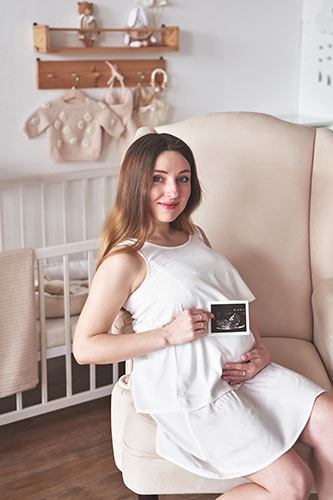
We hear this question from clients all the time: does disability insurance cover my pregnancy?
And the answer is: it depends. There are several different types of disability insurance, plus state coverage for disability and/or family leave (depending on where you live).
To help you sort it out, we’ll go over all the possibilities below:
- Does short-term disability insurance cover pregnancy?
- Does long-term disability insurance cover pregnancy?
- Does your state offer temporary disability payments that cover pregnancy?
- Does your state offer paid family leave?
Keep in mind that even if you don’t have your own disability insurance plan now, it may be a good idea to get one for the future! Click the button below to request a free quote:
Request a Free QuoteDoes Short-Term Disability Insurance Cover Pregnancy?
As its name implies, short-term coverage is only intended to cover illnesses or injuries that keep you out of work for a few weeks or months. It’s not designed to pay out for the complete length of time you may want to take off work after your baby is born. In most cases, short-term policies pay for 6-8 weeks, depending on your delivery type. However, if you have complications that keep you out of work longer, your policy may pay for a few additional weeks of recovery time. It all depends on your unique situation and your doctor’s recommendations.

First, check with your employer to see if you already have (or have access to buy) short-term disability coverage. A lot of our clients have already signed up for short-term coverage through work without realizing it! If your employer doesn’t offer this coverage, you can also buy it on your own – I can help with that, if you’re interested.
Short-term disability coverage replaces a percentage of your pre-disability income for a certain length of time if you are sick or hurt and unable to work. It usually pays between 50-70% of your pre-disability income.
Whether you have coverage through work or bought a policy on your own, check on the policy details. Is pregnancy a covered condition? If so, the policy will offer coverage for a set length of time based on your specific condition. If your doctor puts you on bedrest, for example, and you can’t work, that could trigger your policy’s benefit period. If you are healthy up to the moment of your delivery, childbirth would be what triggers your policy’s benefit period.
There will be a short waiting period before the policy will pay out. But if you have paid vacation time, you can use vacation days to close that gap and make sure you’re getting paid for the longest possible time throughout the period of your disability.
➡️ Want to see how affordable it could be to get your own short-term disability policy? Click the button below to request a free quote!
Request a Free QuoteDoes Long-Term Disability Insurance Cover Pregnancy?
There are two main types of disability insurance: short-term and long-term. Long-term coverage is also referred to as “disability income insurance.” It’s not as common for employers to offer (let alone subsidize) this type of coverage. In most cases, it’s up to you to purchase your own plan.
➡️ If you don’t have a plan yet but want one, I can help! Contact me for a free quote.
Request a Free QuoteLong-term disability plans cover extended periods of illness or disability. Just like the shorter-term plans, they pay you a percentage of your regular income if you experience a covered disability. They also have a waiting period, designed to make sure your illness or injury is really going to keep you out of work for an extended period of time. If your doctor agrees that you still can’t work, even once the waiting period has passed, your policy will start paying benefits.

But here’s the catch: even if you already have your own long-term disability income insurance policy, it probably won’t cover pregnancy. In most cases, pregnancy doesn’t cause a long enough disability to trigger benefits. As a general rule of thumb, these long-term polices are designed to cover illnesses or injuries that keep you from working for at least one year. So if you had a healthy pregnancy and normal delivery, it’s unlikely you’d be unable to work for a whole year.
There is one exception - if you have complications that cause a longer disability. If your pregnancy or delivery results in a health condition that keeps you out of work for longer than a year, that may trigger your policy’s benefit period. It’s all going to depend on your specific circumstances, health needs, and doctor’s assessment.
➡️ Want to see how affordable it can be to protect yourself with a long-term disability policy? Click the button below to request a free quote!
Request a Free QuoteDoes your state offer temporary disability payments that cover pregnancy?

Some states provide short-term disability benefits to residents who meet a minimum threshold for recent hours worked. If you look at your paycheck and see a deduction for “SDI” or “TDI,” that’s what you’re paying for. Keep in mind, though, that paying into your state’s disability program doesn’t guarantee you benefits. You still have to meet the state’s eligibility requirements to get paid. Luckily, the waiting periods are usually brief – about a week.
NOTE: Don’t confuse state disability payments with government disability benefits, which are notoriously difficult to apply for and receive. Click here for more info on the difference between disability insurance and government benefits.
Let’s start with the states that offer short-term disability benefit to qualified workers:
- California
- Hawaii
- New Jersey
- New York
- Rhode Island
These state-sponsored programs offer a percentage of your paycheck amount for a particular benefit period, ranging from 26-52 weeks. All state benefits have a strict cap on how much you can be paid through disability leave, however. So if you have a salary in the six figures and expect to be paid 50% of that salary in the state of New York, it won’t happen – New York caps the benefit amount per week at $170.
To check qualifications and apply for disability benefits, contact your state’s program administrators.
➡️ Worried about a disability derailing your earning potential? I can help you get disability insurance so that doesn’t happen. Click the button below to schedule a call for a free quote!
Schedule a CallDoes your state offer paid family leave?

Some states work with employers to collect payroll tax that provides paid family leave for new parents. A few more states offer paid parental leave, but only for state employees (Georgia, New Hampshire, and South Carolina). Some states have programs for paid family leave, but leave it optional for employers to pay into it (New Hampshire and Virginia).
Although these programs are growing in popularity, they’re not available everywhere yet. As of May 2023, the states that offer paid leave for new parents are:
- California
- Connecticut
- District of Columbia
- Maryland
- Massachusetts
- New Jersey
- New York
- Rhode Island
- Washington
For example, California’s Paid Family Leave Program provides benefits for 4-8 weeks so you can bond with your new baby. Like the state’s short-term disability program, this one pays 60-70% of your wages (averaged for 5-18 months before you file a claim).
States that started paid leave for new parents with benefits available soon are:
- Colorado (benefits available beginning January 1, 2024)
- Delaware (benefits available beginning in January 1, 2026)
- Oregon (benefits available beginning September 3, 2023)
If you don’t see your state listed above, it does not currently offer paid leave for new parents.
➡️ Want to talk to a real person about disability insurance and how it can help you protect your growing family? Click the button below to schedule a call!
Schedule a Call